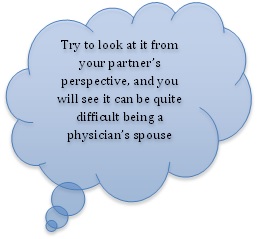
Image courtesy: Ana Hategan
How training and medicine can affect a relationship
The scenario
You are heading home two hours after your shift ended. You had a complicated patient admitted at the end of the day that required more time to interview, examine, and gather collateral information from family and outside hospitals. Additionally, you still had to catch up on some notes from earlier in the day. You are exhausted, as this is your sixth day with more than 14-hour shifts; you are only sleeping about five hours a night; you are hungry - you had a small protein bar and some yogurt at lunchtime, and some peanuts as a snack. Tonight was the night you were going to take your partner out for a nice special dinner to celebrate your partner’s birthday. You only had a brief second to text your partner that you would be “hopefully only an hour late”. When you finally get home at 8:00 PM, you sit in the car for 10 minutes to try to manage your own distress and get rid of some of the tension - you do not want to take it out on your partner when you get home.
As you enter, your partner is sitting on the couch, watching TV, dressed in pajamas, and avoiding eye contact. You walk up to your partner, kneel by your partner's side, grab your partner's hand and say, “I’m sorry – we got busy at the end. Let’s celebrate your birthday tomorrow since I’m off. We can do whatever you want”... No response. After a few seconds of tense silence you ask, “What do you think?”
The argument
An argument ensues, and leads to your partner, once again, listing all the things that are wrong.
Frequent complaints from the non-physician spouses may include the following:
- They feel lonely, isolated. They may say things like:
- “You work too much, you are gone all the time; I am always alone.”
- “You bring work notes home, so even if you’re here, you really aren’t.”
- “When we do spend time together, you are always exhausted, you are not really present.”
- “We have lost so much time together.”
- They feel less of a priority to you. They may say:
- “First it’s your patients, your work, then our kid (if you have one), THEN me!”
- “This happens regularly, it’s a normal occurrence, it doesn’t matter if it’s a special day or a normal day.”
- “I can never count on you to be done when you say you will be. I can’t rely on you for help.”
- “No one really understands how hard this life is for me.”
- “This is not what I signed up for.”
- They feel you put less effort into the relationship. They may say:
- “You assume that just by “celebrating tomorrow” it fixes everything...”
- “Dates are important, and mean something to me.”
- “We always schedule things around your schedule. Even our wedding!”
- “A relationship is supposed to be 50/50, but I feel that ours is 20/80, and I am always putting in the 80.”
- They feel that there is poor communication between the two of you. They may say:
- “When you get home late, you are so tired we can’t even talk.”
- “There is no romance between us. And I never seem to interest you.”
- “I’m not included or a part of your network of friends...
I don’t even like to hang out any more because all you guys do is talk about work and patients."
Other common feelings from the non-physician spouses include:
- Possible resentment to have postponed or sacrificed his/her own goals or social network to accommodate spouse’s medical training, anger, frustration, isolation, or feeling unloved. They may say:
- “Do I still matter to you as a person?”
Parenthood adds an additional dimension to the conflicts, for example:
- Non-physician spouses feel like they do all/most of the parenting. This includes:
- Even small things, such as feeding children, changing them, reading and putting them to bed, taking them to the park, or to school or daycare, doing their laundry, etc.
Resident physician's responses
A resident might think or say:
- “Unfortunately this is how things will go for a while, we knew this.”
- “We had talked before getting together how hard this would be. It’s hard on both of us. I know it’s very hard and isolating for you.”
- “Home life does take a hit, and work unfortunately does have to come first, but only while in training.”
- “I plan for this, for us, for me to get better after residency.”
- “I do love you, and am in love with you. I’m just so tired all the time, but I try to be present as best I can. And I know that sometimes is not the best, but it’s all I can afford at the time.“
- “I know I am tired, but I want to help you with the kids.”
Try to not lose the connection and ask:
"What can I do to help you?"
- Be honest with your partner: let them know how you are doing:
- “I feel like no matter what time I leave the hospital, I have left work undone.”
- “I miss you, I miss my kids, and I miss feeling normal.”
- “No matter what I do, I’m behind at home, and I’m behind at work.”
These responses, while true, may be difficult to hear because they may not make your partner (or you) feel any better.
- They may have been said before, so may sound hollow to your partner.
- Sometimes it may feel like there is no right response; partners are allowed to feel these things, because for the most part, what they say is true.
- It is therefore important to try to see each other’s perspective and validate each other’s experience.
Life with a physician partner
Affects the day to day:
- Most chores fall on non-physician partner
- Taking care of children is very unequal
Affects major life decisions:
- High debt
- Moving to new city for residency, fellowship, or post-training
- Housing (e.g., rent, buy)
- Planning to have children (i.e., too busy to have them as the male, too busy to get pregnant as the female)
- Missing important family events (e.g., weddings, funerals, children performances/activities, family gatherings, holidays)
Tips
For the resident physician:
- Attempt to be PRESENT when with family.
- Try to avoid notes/professional email/work while at home.
- Be understanding of stress that your professional life is putting on your spouse and relationship.
- Remember that it is not only you going through residency.
- Do not be apologetic all the time, as it becomes mundane and meaningless; be responsive rather than reactive and seek to develop effective solutions rather than dwelling in self-blame.
- It is not up to the partner to always accommodate the resident; compromising and renegotiating within a couple is a lifelong challenge.
For the non-physician partner:
- Realize that your partner would most likely also much rather be with you, instead of at work for those additional hours.
- The amount of time they are loosing from being with you is not by choice (per se).
- Remember that in addition to missing out and feeling guilty, they also are hungry, fatigued, both mentally and physically.
- The job asks so much of your resident spouse, and it takes a toll on them and you. They are suffering too.
- Develop hobbies. Be aware that you will be spending a lot of alone-time. Look for a positive outlet.
- After residency, it will get easier; but depending on the specialty, they may still be quite busy.
- Get the support you need, develop a network of other spouses and possibly parents in a similar situation.
- Consider individual therapy to expand coping skills.
- Be prepared to be supportive. Your partner probably had a very difficult day, such as lost a patient. They literally have lives in their hands.
- Burnout is very prevalent in physicians, it is thought to be rooted in the medical environment that physicians practice in, and it can contribute to broken relationships, problematic alcohol use, and suicidal ideation. If you see red flags, talk with your partner about getting support.
For both partners:
Try to maximize the positive interactions to strengthen the relationships and to override more negative memories or associations that we tend to select for.
Maximize overlap with each other:
- Consider couple’s therapy to help with relationship issues that come up.
- Re-examine priorities as a couple.
Did you know?
Remember, at least in the United States, almost one in two physicians have symptoms of burnout!
A general, widely accepted definition of burnout: It is a syndrome characterized by a loss of enthusiasm for work (emotional exhaustion), feelings of cynicism (depersonalization), and a low sense of personal accomplishment. If unaddressed, it can affect not only the physician but also the spouse and family.
Resources
- Podcast: Married to Doctors
- KevinMD.com
- Look to your program or GME office for Spouse Support Groups. Many programs have them, and it is a useful way for non-medical partners to meet others, and feel less isolated. This way, they make new friends that experience similar challenges. And the children can make new friends as well.
- Shanafelt TD, Boone S, Tan L, et al. Burnout and satisfaction with work-life balance among us physicians relative to the general US population. Arch Intern Med. 2012;172(18):1377-85.
- Warde C, Moonesinghe K, Allen W, Gelberg L. Marital and parental satisfaction of married physicians with children. J Gen Intern Med. 1999;14:157-65.


